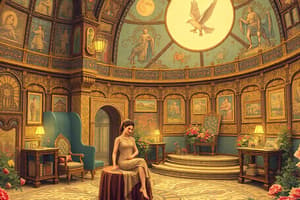Podcast
Questions and Answers
What is an anecdote?
What is an anecdote?
A brief story or tale
What is an allusion?
What is an allusion?
A brief reference to a historical or literary figure, event, or object that the audience should be familiar with
What is an analogy?
What is an analogy?
Comparison of two things that are alike in some respects
What is a thesis (claim)?
What is a thesis (claim)?
What is a metaphor or extended metaphor?
What is a metaphor or extended metaphor?
What is pathos?
What is pathos?
What is logos?
What is logos?
What is ethos?
What is ethos?
What is imagery?
What is imagery?
Who is the audience in writing?
Who is the audience in writing?
What is connotation?
What is connotation?
What are rhetorical devices?
What are rhetorical devices?
What is alliteration?
What is alliteration?
What is a simile?
What is a simile?
What is hyperbole?
What is hyperbole?
What is parallelism?
What is parallelism?
What is a rhetorical question?
What is a rhetorical question?
What is a metaphor?
What is a metaphor?
What is repetition?
What is repetition?
What is anaphora?
What is anaphora?
What is epistrophe?
What is epistrophe?
What is personification?
What is personification?
What is synecdoche?
What is synecdoche?
What is onomatopoeia?
What is onomatopoeia?
What is an author's purpose?
What is an author's purpose?
What is tone in writing?
What is tone in writing?
What is mood?
What is mood?
What is a theme?
What is a theme?
What is restatement?
What is restatement?
What is diction?
What is diction?
What is syntax?
What is syntax?
What is metonymy?
What is metonymy?
Flashcards are hidden until you start studying
Study Notes
Rhetorical Devices Overview
- Anecdote: A short story used to illustrate a point or inject humor.
- Allusion: References to historical or literary figures/events that enhance understanding.
- Analogy: Draws comparisons between similar aspects of two different things; includes metaphors and similes.
- Thesis (Claim): Central argument of an essay that guides the writer's point of view.
- Metaphor/Extended Metaphor: Direct comparison between unlike things; extended metaphors unfold throughout a text.
Persuasive Appeals
- Pathos: Engages emotional responses from the audience to persuade them.
- Logos: Utilizes logical arguments and reason to convince an audience.
- Ethos: Establishes credibility, authority, or ethics to gain audience trust.
Descriptive Techniques
- Imagery: Incorporates sensory details to create vivid pictures, engaging any of the five senses.
- Connotation: Implied meanings and emotional associations related to words.
- Alliteration: Repetition of consonant sounds at the beginning of words for emphasis.
Figurative Language
- Simile: Compares two different things using "like" or "as."
- Hyperbole: Deliberate exaggerations for emphasis or effect.
- Personification: Attributes human traits to non-human entities or abstract concepts.
- Synecdoche: Uses a part to represent the whole or vice versa.
Rhetorical Structures
- Parallelism: Similar grammatical structure across parts of a sentence for rhythm and clarity.
- Rhetorical Question: A question posed for effect, not requiring an answer.
- Repetition: Emphasizes key ideas through repeating phrases or words.
- Anaphora: Repeats a word/phrase at the beginning of successive clauses for emphasis.
- Epistrophe: Repeats a word/phrase at the end of successive clauses to create rhythm.
Additional Elements
- Onomatopoeia: Words that mimic sounds related to their meaning.
- Author's Purpose: The intent behind writing, such as to inform, persuade, express, or entertain.
- Tone: The writer's attitude towards the subject, audience, or character conveyed through diction.
- Mood: The overall feeling or atmosphere evoked in the reader by the text.
- Theme: Recurring ideas or unifying concepts within a literary work.
- Restatement: Rephrasing of ideas for clarity and emphasis.
- Diction: The specific word choices made by a writer or speaker.
- Syntax: The arrangement of words to form well-constructed sentences.
- Metonymy: Refers to something by using a related term to suggest it, such as "the crown" for monarchy.
Studying That Suits You
Use AI to generate personalized quizzes and flashcards to suit your learning preferences.




